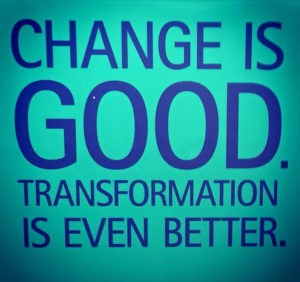 I guess this is a good time as any to think about change. Nature is teasing us with suggestions that biting wind and freezing temperatures will soon be distant memories; I even saw a few crocuses pushing their leaves up out of the frozen ground just this past week.
I guess this is a good time as any to think about change. Nature is teasing us with suggestions that biting wind and freezing temperatures will soon be distant memories; I even saw a few crocuses pushing their leaves up out of the frozen ground just this past week.
While nature is trumpeting change all around us, the truth is there never is a time when change isn’t happening. Change is just part of being human. Fundamentally, if we aren’t changing, we aren’t alive.
Which is not to say that change is especially fun.
I guess there are people who relish constant change, like my daughter: one can never be sure what color her hair will be on any given day. But most folks I know, including myself, find change disconcerting at best — and sometimes we’ll do anything we can to pretend it doesn’t happen.
Why? Change rattles the tidy parameters we place around our lives. It constantly reminds us that most of what we know for sure, we don’t really know for sure. Change invites us, or forces us, depending on your point of view, to step out into the unknown, to face situations that feel unfamiliar, to say goodbye to some things and hello to others.
Sometimes change even makes us have to learn new ways of being in the world, the process of which feels wobbly and unstable.
I was thinking about this the other day when I was rushing through the airport to catch a plane. Out of the corner of my eye I caught view of a large turquoise sign hanging above the escalator. It read: “Change is good. Transformation is even better.”
 I quickly pulled out my phone and took a picture of the sign. I wanted to remember those two sentences, because they summed up everything I’ve been grappling with in my own life and in the life of my faith community as we’ve navigated inevitable change of late.
I quickly pulled out my phone and took a picture of the sign. I wanted to remember those two sentences, because they summed up everything I’ve been grappling with in my own life and in the life of my faith community as we’ve navigated inevitable change of late.
Change is going to happen — individually and corporately. It seems to me that it’s transformation that is optional. We can live in denial, holding tight the illusion that we can prevent change. But change is relentless, and we are not immune.
Or, we can welcome change as a vehicle of transformation, and opportunity for growth and hope and future.
That doesn’t mean the change won’t hurt, but at least we’ll save ourselves some wasted resistance — and maybe even we’ll find in ourselves hearts open to possibility we never dreamed. I think maybe that’s what Paul was trying to suggest when he wrote to the church in Rome: “I appeal to you therefore, brothers and sisters, by the mercies of God, to present your bodies as a living sacrifice, holy and acceptable to God, which is your spiritual worship. Do not be conformed to this world, but be transformed by the renewing of your minds, so that you may discern what is the will of God — what is good and acceptable and perfect.” (Romans 12:2)
It seems that God is in the business of transformation. Not change for the sake of change, but inevitable change as an invitation to transformation — newness — possibility — the opportunity to become what we perhaps could never have imagined.
If you put it that way, I think I might be able to begin to summon some openness, and maybe even the beginnings of appreciation, for the invitation to step into the change that’s constantly happening. The discomfort is a given, but so is the possibility that I will, that we will, emerge on the other side, transformed.
